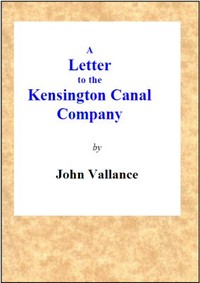A Letter to the Kensington Canal Company on the Substitution of the Pneumatic…
"A Letter to the Kensington Canal Company on the Substitution of the Pneumatic Railway for the Common Railway" by John Vallance is a scientific publication likely written in the early 19th century. The work presents an argument in favor of adopting a new pneumatic railway system to enhance transportation between Kensington and the Grand Junction Canal, offering an alternative to conventional railways or canal expansion. Vallance aims to make a case that
this method would be both economically feasible and more efficient for transporting goods and passengers. The opening of the letter establishes a context for the discussion, outlining the challenges faced by the Kensington Canal Company in their proposed railway extension project. Vallance critiques the anticipated expenses involved with traditional railway construction methods, such as the costs associated with extensive cuts, embankments, and the required infrastructure. He emphasizes the pneumatic system's advantages, including reduced land requirements, lower construction costs, and the potential for rapid conveyance using atmospheric pressure, which he believes offers a more economical solution as well as a method less disruptive to local landowners. Vallance is keen to prove that his innovative approach not only meets practical transport needs but also challenges preconceived notions about feasibility in engineering. (This is an automatically generated summary.)
Read or download for free
| How to read | Url | Size | |||
|---|---|---|---|---|---|
| Read now! | https://www.gutenberg.org/ebooks/62153.html.images | 326 kB | |||
| EPUB3 (E-readers incl. Send-to-Kindle) | https://www.gutenberg.org/ebooks/62153.epub3.images | 143 kB | |||
| EPUB (older E-readers) | https://www.gutenberg.org/ebooks/62153.epub.images | 146 kB | |||
| EPUB (no images, older E-readers) | https://www.gutenberg.org/ebooks/62153.epub.noimages | 140 kB | |||
| Kindle | https://www.gutenberg.org/ebooks/62153.kf8.images | 245 kB | |||
| older Kindles | https://www.gutenberg.org/ebooks/62153.kindle.images | 216 kB | |||
| Plain Text UTF-8 | https://www.gutenberg.org/ebooks/62153.txt.utf-8 | 300 kB | |||
| Download HTML (zip) | https://www.gutenberg.org/cache/epub/62153/pg62153-h.zip | 133 kB | |||
| There may be more files related to this item. | |||||
Similar Books
About this eBook
| Author | Vallance, John |
|---|---|
| Title | A Letter to the Kensington Canal Company on the Substitution of the Pneumatic Railway for the Common Railway by Which They Contemplate Extending Their Line of Conveyance |
| Note | Reading ease score: 46.9 (College-level). Difficult to read. |
| Credits | Transcribed from the 1833 George Wightman edition by David Price |
| Language | English |
| LoC Class | TF: Technology: Railroad engineering and operation |
| Subject | Canals -- England |
| Subject | Railroads -- England |
| Subject | Railroads, Atmospheric |
| Category | Text |
| EBook-No. | 62153 |
| Release Date | May 16, 2020 |
| Copyright Status | Public domain in the USA. |
| Downloads | 134 downloads in the last 30 days. |
| Project Gutenberg eBooks are always free! | |


